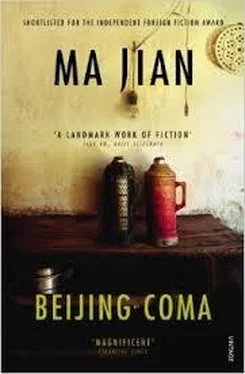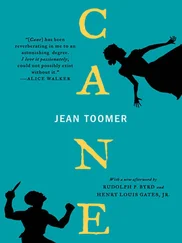‘What if it’s a girl?’ I asked, lighting another cigarette. Ever since my mother had given up complaining about my smoking, I’d been able to get through a packet of cigarettes a day.
‘An astrologer told us it’s a boy,’ Dongsheng said. ‘We’ve given him a name already: Dai Jianqiang.’
‘Look, another kick!’ the wife said. ‘He’s been moving all the time these last few days. Girls never move this much.’
‘You can sleep here tonight,’ my mother said dejectedly. ‘We’ll come up with a plan tomorrow. Dai Wei, go and turn off the kettle.’
A smile passed over Dongsheng’s face. His wife smiled too, and said, ‘We’re sorry to put you to so much trouble.’
‘Who’s looking after your father now?’ my mother asked.
‘His mind’s unstable, but he’s able to look after himself,’ Dongsheng replied. ‘If we have a boy, I’ll pick up a job here, make enough money to pay the fine, then we can all go home and be together.’ He paused and stared at the screen again. ‘Look at those tall buildings in Shenzhen. How do people manage to live in them? You’d wet your pants before you had time to make it outside to the latrines.’ He finished his cigarette and spat a glob of phlegm onto the floor.
‘The buildings are equipped with lifts. And anyway, all the flats have toilets.’ I glanced at my mother’s face. She hated people spitting onto the floor.
‘They’re living in the sky,’ the wife said, smiling. ‘If they opened the windows, the birds could fly straight in.’
‘Dai Wei will be going to university soon, I suppose?’ Dongsheng said.
‘I’m revising for my high school exams,’ I said, wiping away his spit with the sole of my shoe. I didn’t mention I’d dropped out of school. I hadn’t been back again since the November morning when Lulu was called onto the stage during assembly.
We had just completed our mass morning exercise routine. The headmaster called Lulu onto the stage at the front of the football pitch. I watched her standing up there, her head bowed low. Her thin, pale neck looked beautiful against her red down jacket. We hadn’t spoken to each other since the police had taken us in for questioning.
The headmaster told her to remove her hat. ‘Look at this, students! A high school student wearing nail varnish and rouge! What a disgrace!’ He ran his finger down her cheek, then removed his glasses and examined it closely, searching for traces of rouge.
Finding nothing there, he then rubbed Lulu’s mouth, and this time, despite his poor eyesight, he was able to detect some colour on his finger. ‘Red lipstick? This is a serious case of “bourgeois liberalism”, young girl! How can you hope to join the revolutionary classes after you leave school if you put stuff like this on your face? And look at these waves in your hair. Are you trying to turn yourself into a curly-haired lapdog of imperialist America?’
I wanted to disappear into the ground. I’d never imagined that my actions would get Lulu into so much trouble. The thousands of students in the football pitch who were staring at Lulu’s red lips opened their mouths and let out mocking cries of derision.
After my first trip to Guangzhou, I was able to buy a television, a new bicycle for my brother and a rayon coat and nylon umbrella for my mother.
After my second trip, I came back to Beijing with twenty pirated tapes of romantic ballads sung by the ‘decadent’ Taiwanese singer, Deng Lijun, and made more than two thousand yuan selling them on the black market. I also brought over a thousand cigarette lighters with pictures of naked women stuck onto them. They’d cost me five fen each in Guangzhou, and I was able to sell them for ten times the price in Beijing. I asked the vendor I’d bought them from to post me some more, but he was arrested for trading in obscene products and sentenced to five years in jail.
On my last visit to Guangzhou, I bought twenty copies of the Hong Kong edition of Playboy magazine, and posted them to Beijing wrapped inside a long cotton dress. On the train back, a man from Hunan Province who was sitting next to me was arrested for possession of pornographic playing cards. He’d hidden the cards in a shoebox. When two police officers strolling down the carriage spotted the box on the floor and asked him whom it belonged to, he was too afraid to speak. The officers opened the box, and after they saw what was inside, they put him in handcuffs and dragged him off the train. On his seat he’d left behind a copy of The Book of Mountains and Seas — the book I’d loved so much as a child. I put it in my bag then ate the packet of Silly Boy sunflower seeds that he’d also left behind.
Like a prisoner in an execution chamber, you look back on the life which could end at any moment.
The basal cells of my nasal cavity’s olfactory organ begin to reconnect intermittently with the surrounding nerve fibres. I inhale slowly through my nostrils, and for a second catch a faint whiff of orange peel.
I listen intently for any noise that might help me form a clearer picture of my surroundings. When I first became aware of this hospital, I couldn’t hear a thing. I felt as though I’d sunk to the bottom of the sea. Only the beat of my heart told me that my body hadn’t finished dying yet.
I think back to the morning I left home to go to university for the first time. I woke up on the iron bed. Because I’d suddenly shot up to 1.8 metres, my mother had swapped rooms with me.
In just six months of private study, I’d completed the entire Year Twelve science course, and thanks to preferential treatment given to students with relatives abroad, I’d managed to gain a place at Southern University in Guangzhou City to study for a degree in biology. I’d visited the university on my last trip to the city. Many students from Hong Kong and Macao studied there, and the academic requirements weren’t too high.
My mother handed me a fried dough stick and said, ‘You must study hard. There’s no point going to university unless you get a graduation certificate at the end of it.’
I lay in bed, munching on the dough stick. ‘I’m nearly seventeen years old, Mum. Dad said he wanted me to read his journal once I’ve left school. Let me see it.’
My mother’s expression hardened. ‘Dai Wei, although your father was rehabilitated, his outlook on the world remained skewed,’ she said. ‘The Party has learned its lesson from the way it treated people like him, and it won’t make those mistakes again. You must remember that when you read the journal, and not look at things too negatively. I wanted to burn it, but it was his dying wish that you should read it one day. If I do give it to you, you must promise not to show it to anyone else.’
‘Times have changed, Mum. There’s no stigma to being the son of a rightist or a capitalist any longer. Now that Deng Xiaoping is liberalising the economy, people like you, who come from a wealthy background, are held in higher respect.’
Unfortunately for my mother, her family had no foreign connections. She had an older brother and a younger sister. I suppose they were my uncle and aunt, but my mother hadn’t been in touch with them for decades, even though her sister lived in Beijing. The wife of my mother’s uncle travelled down from Tianjin to visit us when I was eleven or twelve. She brought out a handful of peanuts, placed them on our table and talked about her life. It was then that I learned that my mother’s uncle had been a Guomindang general before Liberation. When Communist peasants dragged him up a hill and were about to execute him, his wife went to his rescue. She shouted out to them that when the next political campaign came around, they’d have to pick a new class enemy from one of their own families. The peasants decided to let my great-uncle go, so they could use him as a target in any future campaign. During the land reform movement a few years later, he was brought out again to be an object of hatred, saving many lives in the village. After all the landowners and rich peasants of the surrounding ten villages had been executed, he was lent out to them to play the enemy in their campaigns as well.
Читать дальше












